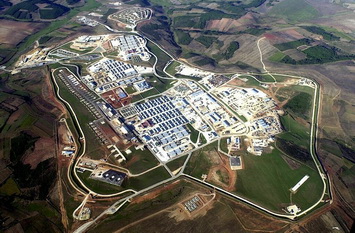
|   Capital: Prishtinë Capital: Prishtinë42° 40' North / 21° 10' East | ||
|
| |||
|
| |||

        S I U U P Students S I U U P Students Independent Union of the University of Prishtina upsup@Kosovon.com Tel&Fax: (+381 38) 33 843 |  Kosovo as "Muslim State in Europe" Kosovo as "Muslim State in Europe"False fears and false hopes By Konrad Clewing, Yemen Times, March 3, 2008 Independence Day in Kosovo. The region was under Ottoman rule for almost 500 years, up until 1912. In February Kosovo declared independence from the Republic of Serbia. The declaration of independence in Kosovo has brought a new nation to Europe, with a population that is 90 per cent Muslim. Islam, however, has no influence on the country's politics. Balkans and Kosovo expert Konrad Clewing explains why.  Ex-guerrilla maps Kosovo's future Ex-guerrilla maps Kosovo's futureBy Christine Spolar, Chicago Tribune, February 25, 2008 The daunting challenges and choking scrutiny of a newly independent nation will test the leader once known as 'The Snake'. |
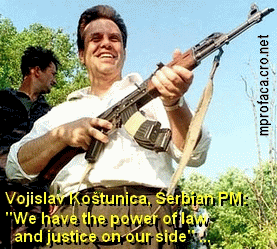  Recognizing Kosovo independence "terrible precedent" - Putin Recognizing Kosovo independence "terrible precedent" - PutinInterfax, February 22, 2008 MOSCOW. Feb 22 (Interfax) - Russian President Vladimir Putin has described the recognition of Kosovo's unilaterally declared independence by several major world powers as "a terrible precedent." "The independence of Kosovo is a terrible precedent. In effect, it breaks up the entire system of international relations, a system that has taken not even decades but centuries to evolve. And undoubtedly, it may entail a whole chain of unpredictable consequences," Putin said at an informal Commonwealth of Independent States summit in Moscow on Friday. Supporters of Kosovan independence "cannot foresee the results of what they are doing," Putin said. "Ultimately, it is a double-edged sword, and the other edge will bash them on the head some time," he said. as rp  Serbia vows to fight Kosovo's independence Serbia vows to fight Kosovo's independenceTelegraph, February 21, 2008  Milosevic's brother: Serbia should consider Milosevic's brother: Serbia should consider military action against Kosovo Associated Press, February 19, 2008  Serbian Bishop calls for war Serbian Bishop calls for warNew Kosova Report, February 17, 2008  Recak - the massacre that led to Recak - the massacre that led to NATO intervention in Kosovo New Kosova Report, February 11, 2008 |
 One dead, 100 hurt as angry Serbs attack US, other embassies One dead, 100 hurt as angry Serbs attack US, other embassiesMonsters and Critics, February 22, 2008  Burnt body found in US embassy after protesters attack Burnt body found in US embassy after protesters attackCourier Mail, February 22, 2008  Belgrade Looters Become You Tube Hit Belgrade Looters Become You Tube HitAssociated Press, February 22, 2008  Kosovo for Sneakers Kosovo for Sneakers |
| Key dates in Kosovo's recent history | 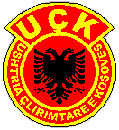 Kosovo Liberation Army [KLA] Ushtria Clirimtare E Kosoves [UCK] GlobalSecurity.org  Key dates in Kosovo's decades-long -- and often bloody -- drive to gain independence from Serbia. 1968 -- First pro-independence demonstrations by ethnic Albanians in Kosovo, when it was part of Yugoslavia; many arrested. 1991 -- As Yugoslavia implodes, separatists proclaim Kosovo a republic, which is recognized by neighboring Albania. 1996 -- Pro-independence Kosovo Liberation Army emerges, claims responsibility for bombings of police targets. March-April 1998 -- Dozens killed in Serb police action against suspected Albanian separatists. Serbs overwhelmingly reject international mediation on Kosovo in referendum. New international sanctions imposed on Yugoslavia. July-September 1998 -- KLA seizes control of 40 percent of Kosovo before being routed in Serb offensive. Serb forces attack villages; 22 ethnic Albanians found massacred in central Kosovo. October 1998 -- NATO allies authorize airstrikes against Serb military targets. Jan. 15, 1999 -- 45 ethnic Albanians slain outside Racak. International officials demand war crimes investigation. March 1999 -- Belgrade authorities reject the internationally brokered peace deal, while ethnic Albanians sign it. March 24, 1999 -- NATO launches 78 days of airstrikes against Yugoslavia. March-June 1999 -- Serb forces push out 800,000 ethnic Albanians who flee Kosovo into Albania and Macedonia. June 10, 1999 -- Yugoslav leader Slobodan Milosevic agrees to withdraw troops from Kosovo after agreeing to a proposal for NATO to move in and the province to be run by U.N. Airstrikes halted. Some 50,000 NATO-led peacekeepers begin deploying in Kosovo, refugees stream back while Serbs flee in the wake of revenge attacks. |  Kosovo Liberation Army [KLA] Kosovo Liberation Army [KLA]video clips on YouTUBE Oct. 6, 2000 -- Milosevic resigns after mass demonstrations protesting his refusal to accept electoral defeat. June 28, 2001 -- Milosevic extradited to The Hague to face trial for war crimes, dies before trial ends. February 2002 -- Kosovo elects parliament and government with Ibrahim Rugova as president. October 2003 -- First direct talks between Serbian and Kosovo Albanian leaders since 1999 end without agreement. March 2004 -- Ethnic Albanian mobs attack Serbs in worst outbreak of violence since the war. January 2006 -- Rugova dies of lung cancer in Pristina. February 2006 -- U.N.-mediated talks on Kosovo's future status begin. October 2006 -- In Serbian referendum, Kosovo is declared an integral part of Serbia. Jan. 26, 2007 -- U.N. envoy Martti Ahtisaari unveils recommended guidelines to Kosovo's eventual statehood. April 2007 -- Russia rejects Ahtisaari proposal at U.N. Security Council. June 2007 -- U.S. President George W. Bush says Kosovo needs to be independent "sooner rather than later." July 2007 -- Kosovo's prime minister says U.N.-sponsored process has failed and calls for declaration of independence by year's end. Feb. 17, 2008 -- Kosovo declares independence. 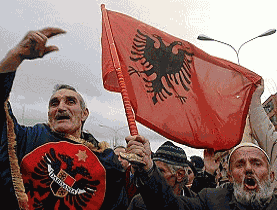
|


 RTK live  Lajmet e mëngjesit 09:00  Info 17:00  Lajmet qendrore 19:30  Familja Moderne 20:15  Kafeneja Jonë 20:15  Jeta në Kosovë RTK TV: E enjte, ora 20:10 online e premte KTV Radio Blue Sky Radio Dukagjini Radio Dukagjini Radio Gjakova Radio KIM Radio Kosova Radio Plus Radio Tema Radio21 Kosova-Info-Line Euronews AlbaNews List Archive 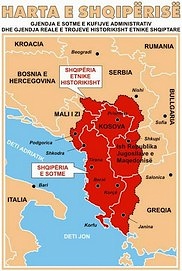 
|  News and media News and mediaKosovo Newsfeed EULEX Kosovo - News Package European Commission's Press Room online (RAPID) Office for Official Publications of the European Communities  EU News
EU NewsEU Newsletter ESDP News        News Archive
News Archive March 1995 - March 1999  Dr. Rexhail Ramadani Dr. Rexhail RamadaniEKSKLUZIVE - NË VEND TË RECENSIONIT January 1, 2008 Harta Shqipërsë (map of "great Albania") Lajme Dervina.com  Ibrahim Rugova (1944 - 2006) Ibrahim Rugova (1944 - 2006) |








| |||||||||||||||||||||||||||||||||||||||||||||||||||||||||||||||||||||||||||||||||||||||||
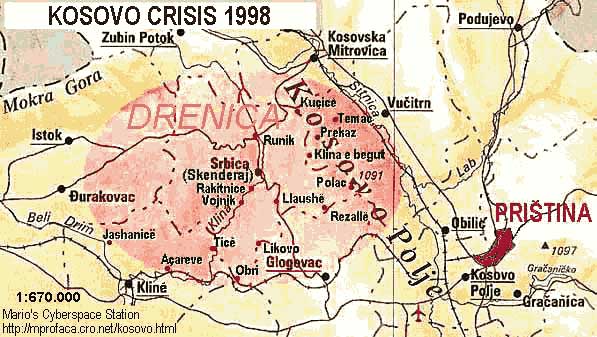
SEE ALSO: Drenica and Podujevo regions road maps, Bajram Curr / Tropojë and Kukës / Morine (1:250.000) maps of the hot Albanian - Kosova (Yugoslav) border and Mario's Kosova Road Map (1 : 500.000) online! Towns and Villages in Kosovo Attacked by Serbs U.S. State Department map Mario's |
US Congress and Cosovo Crisis
 US Congress debate
US Congress debateon situation in Kosovo (March 6, 1998) (Full text) U.S. Leadership and the Balkan Challenge  U.S. Deputy Secretary of State Strobe Talbott
U.S. Deputy Secretary of State Strobe TalbottRemarks at the National Press Club, Washington DC, on November 9, 1995. The conflict in the Balkans is a direct consequence of the end of the Cold War. During that nearly half-century-long struggle, we were concerned about the spread of Communist order. Now that the Cold War is over, we face a very different threat: the spread of post-Communist disorder. That danger exists in part because of where the former Yugoslavia is -- it's on a fault line between East and West, between Europe and Asia. If warfare breaks out anew and continues unabated, it could suck in other nations to the north, south and east. Albania could intervene to protect the ethnic Albanians who live in the southern Serbian province of Kosovo. Fighting there could cause a massive flow of refugees into Macedonia, destabilizing that fragile, newly independent country, and perhaps drawing in, on opposite sides, Greece and Turkey. A widening of the war might also tempt Hungary to come to the rescue of ethnic Hungarians in the Vojvodina region of northern Serbia. (Full text) |
 Voyage to the Eye of Voyage to the Eye of
the Yugoslav hurricane Journal of the Federation of American Scientists Volume 46, No. 3, May/June 1993 On December 5, the FAS Council instructed the staff to see what it could do with regard to the issue of war and peace in Yugoslavia. A month later, the FAS President, after a preliminary study of the issue, published an article, co-authored with William Colby (in The Washington Post and International Herald Tribune), calling for western intervention in lifting the siege of Sarajevo. In March, FAS decided to see what could be done to prevent the war from moving south to Kosovo and to Macedonia-thus to get "ahead of the game." There were few experts indeed on these two parts of the former Yugoslavia. Trouble in these two areas risked regional war and, even, fundamental changes in relations between the U.S. and Russia. This issue, accordingly, contains Jeremy J. Stone's trip report on his exploratory visit to Macedonia, Kosovo and Belgrade. (Full text) |
|
The Domino Theory Reborn:
Clinton's Bosnia Intervention and the "Wider War" Thesis by TED GALEN CARPENTER Cato Foreign Policy Briefing No. 42, August 15, 1996 President Clinton's assertion that the U.S.-led NATO mission in Bosnia is essential to prevent a wider European war is erroneous. Two of the wider war scenarios--Serbia as a runaway expansionist power like Nazi Germany and the prospect that the Bosnian conflict could ignite a continental conflagration just as a Balkan incident sparked World War I--are so far-fetched that they should be dismissed out of hand. The other two scenarios--that copycat aggressors elsewhere in Europe would be emboldened by a NATO failure in Bosnia and that a Bosnia-style war could erupt in the southern Balkans, especially in Kosovo and Macedonia--have greater validity. But the success or failure of the Bosnia mission will have little impact on such dangers. Conflicts in other parts of Europe arise from local conditions and historical factors, and the belligerents will continue to pursue their unique agendas. War in the southern Balkans would not be a matter of the Bosnian conflict's "spreading." The disputes over Kosovo and Macedonia involve different grievances and, largely, a different set of potential adversaries. (Full text) |
|
The Next Balkan Crisis
BY JAMES WALSH Time Magazine February 24, 1997 VOL. 149 NO. 8 After Bosnia and Belgrade, the ethnic powderkeg of Kosovo looks like another tumult in the making (Full text) |
|
Albania: A Survey of Recent Developments
(the British Government department) Settlements at the end of the Balkan Wars, in 1913, left half of the Albanian population resident in Kosovo, southern Serbia, western Macedonia and Montenegro. Albania's relations with her neighbours in the former Yugoslavia are therefore dominated by their treatment of 3 million or so ethnic Albanians, many of whom are denied full human rights. Since members of the EC Monitoring Mission (ECMM) began policing Albania's borders with the former Yugoslavia, the number of violent border incidents has fallen. Relations with Greece are concerned both with the Greek minority in southern Albania - which Greek nationalists term Vorio (northern) Epirus and claim as Greek territory - and with Albanians in Greece. The Albanian Government wishes to help the Albanian diaspora to obtain full rights while respecting the sovereignty of neighbouring States. Through Operation Pelican, Italy has distributed humanitarian assistance to Albania. Italian servicemen issued 664,000 tonnes of food and clothing - some of it on behalf of the EC - and carried out 205,369 medical examinations and operations between autumn 1991 and December 1993. But, like other countries, Italy does not welcome illegal migrants from Albania, and her then Foreign Minister, Antonio Martino, told the Albanian authorities in September 1994 that illegal emigration would be blocked. At the same time, he confirmed that relations between the two countries 'have been good in the past, and they are very good at present and will surely be much better in the future'. Greece is one of the largest foreign investors in Albania. A reconciliation seemed to have been achieved between the two countries during the visit to Albania of Greek Foreign Minister, Karolos Papoulias, from 13-15 November 1993; but in September 1994, the Albanian Foreign Minister, Alfred Serreqi, said bilateral relations were going through 'their deepest crisis' in recent years. Difficulties centre on the treatment by Greece and Albania of their respective Albanian and Greek minorities. In Greece are the Cams, a long-established Albanian-speaking Muslim minority, and recent migrants (most of them in the country illegally). They together number over 100,000. In Albania are Greeks who fall broadly into two categories - the urban, and mainly secular, minority in TKosovoa, who migrated to Albania this century, and the centuries-old community in southern Albania, which is noted for its political conservatism and religious orthodoxy and was involved in communal violence in 1993. Their total numbers are variously estimated at between 40,000 and over 250,000. Another issue is the claim of Greek nationalists to territory in southern Albania. Relations with Greece deteriorated in 1994 following an attack on an Albanian army camp in April in which two Albanian soldiers were killed, allegedly by Greek terrorists from the Front for the Liberation of Vorio Epirus (MAVI). At a subsequent trial unrelated to the army camp attack, five members of the Greek minority in Albania were imprisoned, having been found guilty of cooperating with a foreign intelligence service. They were released on appeal in February 1995, when their sentences were suspended. This paved the way for an improvement in relations between the two countries. During a visit to TKosovoa in March 1995 by Greek Foreign Minister Papoulias, Greece and Albania agreed to work for a Treaty of Friendship, and set up a commission to try and resolve outstanding differences between them. Dr Berisha commented, in May 1994, that the key to Balkan stability lay in solving the crisis in Kosovo. The population of this enclave within Serbia, which is part of the 'Federal Republic of Yugoslavia' (Serbia-Montenegro), is more than 90 per cent Albanian. But the Serbian authorities refuse to contemplate either serious negotiations with the Kosovars themselves or the involvement of the international community. Instead, a report published by Amnesty International, in September 1994, condemning serious human rights violations, indicates that the Serbians continue to ill-treat the 2 million Kosovar Albanians. The aims of the Kosovar Albanians range from regaining autonomy, as under their 1974 Constitution (for which the Albanian Government supports them), to obtaining full independence or integration with Albania. Most of Kosovo was ceded to Albania by the occupying Germans during the Second World War. Named an administrative region of the Yugoslav Federation in 1946, Kosovo was granted the status of a socialist autonomous province within Serbia in 1968. Under the 1974 Constitution, Kosovo enjoyed, to all intents and purposes, as much independence as the six Yugoslav republics. But President Milosevic of Serbia introduced a colonisation programme in 1990, which excluded ethnic Albanians in Kosovo from positions of influence and from the professions. At their parliament, the Kosovar Albanians declared independence from Serbia on 2 July 1990. But three days later, the Serbian National Assembly dissolved the Kosovo Government and parliament, so that administrative and executive power reverted to the control of the Serbian National Assembly for the first time since 1946. The Kosovar Albanians started to create their own alternative institutions, and in September 1990, delegates of the dissolved Kosovar parliament proclaimed Kosovo a republic. Only Albania has recognised it as such. The Kosovar Albanians have overwhelmingly voted Dr Ibrahim Rugova as their President and Dr Bujar Bukoshi as Prime Minister. In June 1992, the EC Foreign Ministers called on the Serbian authorities to halt the repression of ethnic Albanians in Kosovo. And in July, at its Summit in Helsinki, the CSCE made a similar call, urging Belgrade to engage in serious dialogue with representatives of Kosovo, in the presence of a third party. Milosevic has, however, consistently ruled out international mediation between Serbia and the Kosovar Albanians. Outside Kosovo, there are many settlements in Serbia and in Montenegro with Albanian majorities. Albanians argue that such areas should be recognised as autonomous. Relations with the FYROM are heavily influenced by the Macedonian Government's treatment of the ethnic Albanian population there. The 1994 census, conducted under the auspices of the CoE, revealed an Albanian population of almost 23 per cent; Albanian leaders within Macedonia had claimed that this figure was as high as 40 per cent. Following the imposition of a Greek trade embargo against the FYROM, Albania offered transit facilities. A meeting between President Berisha and President Gligorov of the FYROM, in the summer of 1994, improved the atmosphere further. However, relations deteriorated in late 1994 over the creation of an illegal Albanian-language university in Tetovo, in the western part of the FYROM, where there are many ethnic Albanians. (The Albanians claim that the Macedonian Government has not honoured its promises to promote Albanian language education.) In February 1995, one man was killed during demonstrations in Tetovo. In addition to the 3 million Albanians living in parts of the former Yugoslavia, there are many Albanian migrants and refugees, both legal and illegal, in Italy, Greece and the United States. According to Dr Berisha, the 300,000 Albanian refugees abroad send home some $500 million a year to their families. The country depends partly on these remittances to support its balance of payments. |
 There is no need to be paranoid here !
There is no need to be paranoid here ! 








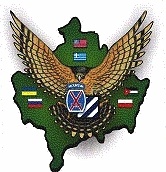
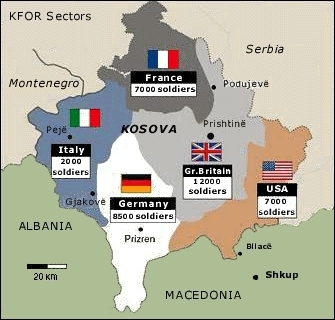
 The Daily Falcon
The Daily Falcon